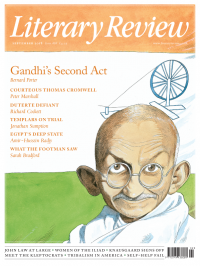Edward Vallance
Leveller Headed
The Common Freedom of the People: John Lilburne and the English Revolution
By Michael Braddick
Oxford University Press 391pp £25
The 17th-century Leveller leader John Lilburne has been lauded as a historical hero by political figures as diverse as the former UKIP MP Douglas Carswell and the current Labour leader Jeremy Corbyn. Lilburne now vies with the Digger Gerrard Winstanley for the title of most celebrated Civil War radical: ‘Free-born John’ has been depicted on the small screen (in Channel 4’s The Devil’s Whore) and has inspired a rock opera (written by Rev Hammer). These representations of Lilburne have rested largely on the work of the British Marxist historian Christopher Hill, still the greatest populariser of this country’s 17th-century history.
Hill’s influence was clear to see in the last biography of Lilburne, written by Pauline Gregg and first published in 1961. Gregg, a Hill acolyte, produced a biography very much in her mentor’s image: Lilburne in this analysis was a godfather of modern British democratic movements, such as the Chartists, and represented an important ‘link’ in the British radical tradition (though Gregg was careful to state that there was no direct evidence of the transmission of Lilburne’s ideas into Chartist thought).
Since the publication of Gregg’s biography, 17th-century historiography has undergone a revolution. In the 1970s and 1980s, ‘revisionist’ historians took aim at Marxist scholarship such as Hill’s, attacking its methodology (for example, Hill’s overreliance on printed sources) and its arguments, not least the stress placed by Hill in

Sign Up to our newsletter
Receive free articles, highlights from the archive, news, details of prizes, and much more.@Lit_Review
Follow Literary Review on Twitter
Twitter Feed
Henry James returned to America in 1904 with three objectives: to see his brother William, to deliver a series of lectures on Balzac, and to gather material for a pair of books about modern America.
Peter Rose follows James out west.
Peter Rose - The Restless Analyst
Peter Rose: The Restless Analyst - Henry James Comes Home: Rediscovering America in the Gilded Age by Peter Brooks...
literaryreview.co.uk
Vladimir Putin served his apprenticeship in the KGB toward the end of the Cold War, a period during which Western societies were infiltrated by so-called 'illegals'.
Piers Brendon examines how the culture of Soviet spycraft shaped his thinking.
Piers Brendon - Tinker, Tailor, Sleeper, Troll
Piers Brendon: Tinker, Tailor, Sleeper, Troll - The Illegals: Russia’s Most Audacious Spies and the Plot to Infiltrate the West by Shaun Walker
literaryreview.co.uk
Vladimir Putin served his political apprenticeship in the KGB toward the end of the Cold War, a period during which Western societies were infiltrated by so-called ‘illegals’.
Piers Brendon examines how the culture of Soviet spycraft shaped his thinking.
Richard Vinen - Dictator in the Dock
Richard Vinen: Dictator in the Dock - 38 Londres Street: On Impunity, Pinochet in England and a Nazi in Patagonia by Philippe Sands
literaryreview.co.uk